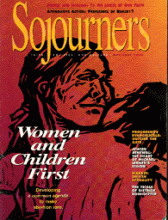In the early days of the Gulf war, ABC's Nightline took a break from round-the-clock coverage of lit-up skies and talking dignitaries and shifted its attention to MTV's refusal to air the video for Madonna's song "Justify My Love." The video depicted both hetero- and homosexual interactions (she kissed another woman) and bondage (she tied herself to a bed) which, MTV claimed, would offend viewers and sponsors. Madonna argued that the video depicted her unabashedly in charge of her sexuality and was no more offensive than standard MTV fare featuring scantily clad women debasing themselves before men.
The case strikingly exposed our society's stunted capacity to discern what is good and acceptable. While smart bombs and clever generals upstaged corpses and devastation, "decency" de-manded casting Madonna as a lewd pariah instead of a shrewd, authentically Ameri-can businesswoman.
The power to determine what is seen and said in this country is enormous, and it shapes our perception of freedom and propriety. In this decade alone, debates over National Endowment for the Arts funding, hate speech on campuses, and controlling cyberspace have revealed just how difficult is the balancing act between personal freedom and corporate good.
Whirling through this maelstrom is the contentious debate over whether or not to censor pornography. Nadine Strossen, president of the American Civil Liberties Union and author of Defending Pornography, argues that censorship violates women's rights and perpetuates the myth of our powerlessness. Andrea Dworkin and Catherine MacKinnon, notable anti-pornography campaigners, argue that pornography violates the civil rights of those who participate in it and that the failure to make it illegal elevates the First Amendment rights of those who create pornography above the basic rights of those whose lives are subjugated by it.
Read the Full Article
